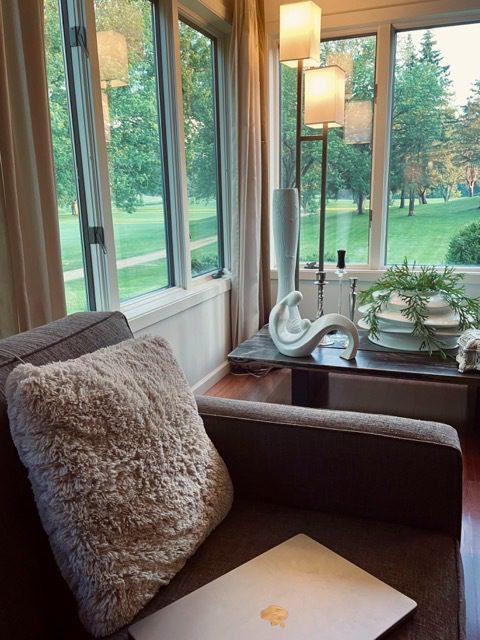
Anabel Moore
I wrote my application to Yale sitting on my grandmother’s couch, in the first-floor living room of her townhouse in rural Minnesota where she’s lived my whole life, with the cherry floors and black carpet and electric stove my mom was always afraid I’d burn myself on. Most of the words came in one sitting, nestled amidst fuzzy gray pillows, as early snow fell outside. Reading my essays now, it’s clear just how much I was influenced by the idea of being in a space that was comforting and homey. I wrote, “I’ve come to see Yale as a place where a kid who loves learning but feels out of sync with her hard-edged high school can finally settle in.”
It’s been just over two years since that day in October. I frequently reference time in the articles I write: I love the here’s, the nows, the then’s. I’m forever looking for a narrative, a way to piece together experiences that are so far removed from anything I could have dreamed of in high school — and removed from even what I dream of today. I craved belonging, yet here, almost two years in, I find myself digging for traces of otherness, of knowing a little bit less about what happens inside these walls. Yale has shown me the way the world works, in more ways than one.
When I was flying back from Seattle over the most recent winter break, I sat next to a middle-aged man, somewhat balding, with coke-bottle glasses on the plane. I glanced over towards the window from the aisle seat and caught a glimpse of his extra-large text message: “yeah, full flight. A lot of college students are heading back, I think.” I was wearing my Yale crewneck, and though I want to make the argument that it was simply the bulkiest piece of clothing I was carting back to school and that I wanted the extra luggage space, that would be a lie. The sweatshirt screamed: “I go to Yale. I’m proud of it. And I don’t shop at H&M. Ask me where I go to school. I dare you.”
I landed at Logan Airport in a swarm of college students, the vast majority of them (obviously) attending school in the greater Boston area. Heading towards baggage claim, I passed a group of girls who were on my flight gossiping about another girl, saying she “gave the same energy” as a student from this all-girls Catholic school near where I grew up. The “energy” they described didn’t seem good, but I knew the type, and, somewhat shamefully, fully identified with their frustration. They moved on to jabber about spring break. I looked for my bag.
I caught a random Uber to the Boston South train station with another Yale student. He had just graduated, and I didn’t know him, but he had gone to a large public high school near me that was not particularly known for sending kids to the Ivy League. It turns out he shared my love of art history, and was thinking about continuing onwards with grad school in the discipline. We chatted about our favorite art history professors and the work he had done at Seattle’s Museum of History and Industry in high school. Back then I still thought I wanted to major in comparative literature.
Somehow, the “Yale bubble” that used to be confined to Lake Place and Orange Street has only grown exponentially. It is harder and harder to remember — and value — that what is normal here really isn’t normal nearly everywhere else. I used to think that “elitism” was about being of a certain economic class, traveling freely around the world or fraternizing at glitzy events. But “elitism,” as I’ve come to realize, is also the knowledge that the door will usually open in your name, in whatever you choose to do. It may not stay wide open, mark you, but the odds are it will always be ajar.
I miss my grandmother welcoming me at the door of her townhouse. She lives alone. We talk less often now than I’d like to, but when we do, I get updates on her friends, on the air plants she soaks once a week, and on her frustration at the multiplying ads in “Architectural Digest” and “Elle.”
Yale changed me, yes; however, it has changed how others see me even more. But not my grandmother. She always opens the door and doesn’t expect me to live up to anyone’s name.







